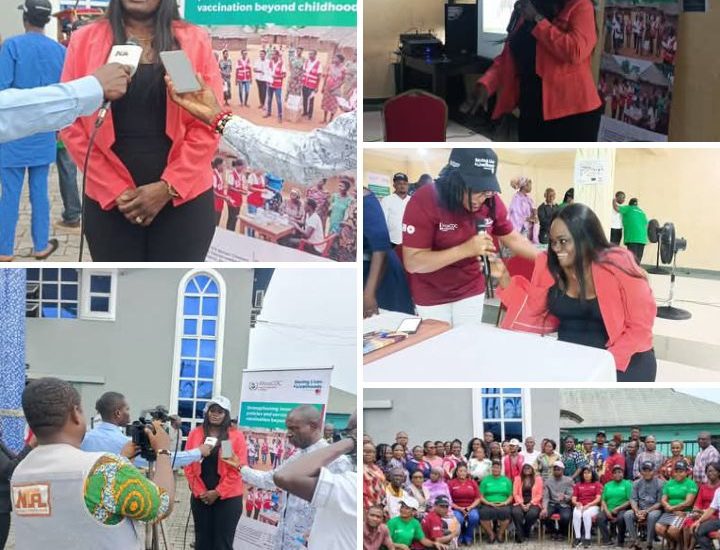RED CROSS BUILDS CAPACITY OF CROSS RIVER HEALTH EDUCATORS AS STATE PREPARES FOR RUBELLA VACCINE INTRODUCTION
✓ Dr Vivian Otu underscores the critical role of social mobilisation officers in vaccine communication, maternal health, and herd immunity.
✓ Two-day capacity-building workshop enhances community engagement and behavioural change strategies across 18 LGAs.
✓ Partnership with Mastercard Foundation, Africa CDC, UNICEF, and NPHCDA boosts Cross River’s preparedness for nationwide immunisation goals.
By Amawu, Cletus Albert Amawu.
Calabar, Nigeria — The Director General of the Cross River State Primary Healthcare Development Agency (CRSPHCDA), Dr (Mrs) Vivian Mesembe Otu, has commended the Nigerian Red Cross Society (NRCS), Cross River State Branch, for its timely capacity-building workshop for health educators, social mobilisation, and behavioural change officers across the state.
Speaking during a sideline interview at the two-day Training of Trainers (ToT) on Risk Communication and Community Engagement/Social Behaviour Change (RCCE/SBC) for Immunisation Life Course Approach, organised by the NRCS under the Saving Lives and Livelihoods Project, in partnership with the Mastercard Foundation, Africa CDC, National Primary Health Care Development Agency (NPHCDA), and UNICEF, Dr Otu described the training as “very important and timely,” particularly as the state prepares to roll out the measles–rubella vaccine in February.
“Our social mobilisation officers are crucial to the success of any immunisation campaign,” Dr Otu stated. “They are our voice in the communities, creating awareness, countering misinformation, and helping people understand the benefits of vaccines, especially when introducing new ones like the rubella vaccine.”
She explained that the mobilisation officers, stationed across all 18 local government areas and at the state level, play a vital role in engaging communities and addressing myths and misconceptions surrounding vaccines. According to her, their work directly determines the success or failure of immunisation campaigns.
“The outcome of any campaign depends on the input of social mobilisation officers,” she added. “If the sensitisation is properly done, the campaign outcome will be excellent; if not, we struggle to achieve coverage. That is why this Red Cross training is so vital, it helps us improve our awareness strategy, campaign outcomes, and ultimately herd immunity.”
Linking the Red Cross Initiative to National Health Goals
Dr Otu further linked the training to the ongoing Maternal and Newborn Mortality Initiative (MAMI) recently flagged off in the state, an intervention under President Bola Tinubu’s Renewed Hope Agenda aimed at reducing maternal and infant mortality rates nationwide.
“The MAMI programme seeks to reduce maternal and neonatal deaths through five key strategies, including improved collaboration and timely access to care,” she explained. “This training complements that goal because immunisation reduces preventable diseases that contribute to under-five and newborn mortality. Both programmes are connected through their shared objective of safeguarding lives and strengthening our primary healthcare system.”
Encouraging Digital Literacy and Professional Growth
In her address to the participants, Dr Otu urged social mobilisation officers to embrace digital literacy as an essential skill for effective service delivery, encouraging them to acquire computer knowledge and adapt to technological demands in modern health communication.
“Don’t wait for the government to send you to a computer school. Learn on your own, even with your phone. Being computer literate will make your work easier and help you grow professionally,” she advised.
She applauded the Red Cross for its foresight in identifying and empowering key community health influencers, adding that such partnerships align with the state’s “People First” healthcare agenda.
“We appreciate the Red Cross for thinking it wise to build the capacity of these officers,” she said. “Without them, our campaigns would not achieve the successes we record today. They are the link between the health system and the people.”
The training brought together Local Government Health Educators (LGHEs), Assistant Health Educators (AHEs), and Social Behavioural Change (SBC) officers from all 18 local government areas of Cross River State. It aimed to enhance their communication, engagement, and advocacy skills to promote vaccine acceptance, counter misinformation, and boost immunisation coverage across communities.
Towards Improved Healthcare Outcomes
With the forthcoming rollout of the rubella vaccine and sustained collaboration between the Red Cross, CRSPHCDA, and development partners, Cross River State is positioning itself to strengthen routine immunisation, improve herd immunity, and reduce preventable childhood diseases.
As Dr Otu aptly concluded,
“At the end of the day, what we are striving for is to deliver quality healthcare to the good people of Cross River State. And that begins with effective communication, community engagement, and a well-trained, motivated health team.”





